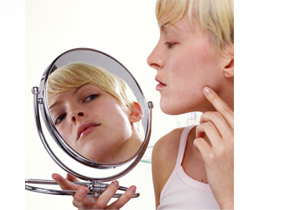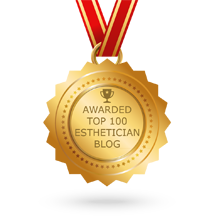There are few things that are more frustrating than acne. Once we reach our late 20s we figure that we shouldn’t have acne any more but that isn’t true for many, many people. Case in point Selma Hayek. Hayek revealed in the May, 2012 issue of Lucky magazine that she suffered from terrible acne as an adult:
“My skin?! When I was 25 and I left being a soap opera star in Mexico to go try to be a movie star in Hollywood and all of Mexico was laughing at me? And I could barely get work as an extra? You want to talk about bad skin? I had acne. And this acne was so bad, it sent me into a severe, severe depression. Like I couldn’t leave the house. I’d wake up in the morning and lie there and touch my face before I got up, just to prepare myself to look in the mirror! “The next stage with that sort of depression is food: too little, or too much. Guess what I did? I mean, I was fat and broken out, I couldn’t leave the house and I couldn’t pay the rent!” A friend, she says, saved her: “Alfonso Cuarón—amazing director—he came to the house. He did not play it down, he did not try to say, Oh you look fine. He said you can’t do this to yourself and taught me to meditate, relax. I got myself back together!” She also went on Accutane. “I didn’t want to, but it cured it. Since then my skin’s forever sensitive and dry.”
Hayek certainly is not alone when it comes to suffering from acne as an adult. According to The New York Times article When ‘Younger’ Skin Is Not A Blessing:
More adult women are getting pimples than ever before, according to a study presented in March at the American Academy of Dermatology annual meeting. Today, clinical acne afflicts the complexions of 45 percent of women ages 21 to 30, 26 percent of women ages 31 to 40, and 12 percent of women ages 41 to 50, according to the study, conducted by researchers at Massachusetts General Hospital.
What Causes Adult Acne?
Just as with teenage acne hormones play a major role in the formation of adult acne. As the WebMD article Is Your Skin Hormonal? explains:
Just as you may see a little thinning in your hairline or the slight shadow of a moustache, more blackheads and blemishes are a sign of aging. “About a third of women will get adult acne, usually in their early 30s, even if they didn’t have breakouts when they were younger,” says Beverly Hills dermatologist Dr. Stuart Kaplan. “Starting in your late 20s, estrogen levels decline faster than testosterone.” Because testosterone is an androgenic hormone, it increases masculine qualities (hence the new facial hair) and boosts oil production, plugging your pores and causing blemishes. The difference between adult acne and the teenage type? Small red bumps (not painful, cystic pimples) are more common when you’re older, according to Kaplan, and acne along the jawline or around the mouth are a telltale sign that you’re dealing with a hormonal breakout.
Furthermore, according to another WebMD article, Adult Acne: Why You Get It, How To Fight It, adult acne is caused by:
Adult acne is caused by sebum, an oily substance produced by the skin’s sebaceous glands. Sebum clogs pores, which attract bacteria and become inflamed. For some adults, breakouts are a result of hypersensitivity or overproduction of androgens (male hormones). But an imbalance in both male and female hormones (estrogen) can also cause breakouts. For women, this can happen during pregnancy, perimenopause, and menopause. Some medications, such as corticosteroids, and cosmetics can also contribute to the development of acne.
There can be even more causes for adult acne which include:
- Changes in humidity or weather
- Cosmetics, skin products or hair products
- Family heritage or hypersensitivity
- High-sugar food & drinks that increase oil production which blocks pores
- Hormones from dairy products, pregnancy or menstrual cycle
- Certain medications, such as corticosteroids
- Smoking
- Stress, which can trigger cortisol that may result in pore-clogging oil
(Source: How To Get Rid of Acne: 6 Treatments You Haven’t Tried! – Future Derm)
If I see a client who has tried everything to get rid of their acne I always ask them about their diet and suggest trying a low-dairy, low-glycemic diet. For some people changing their diet is really what helps their acne. I also truly do believe in a strong link between what is going on with our skin and our stress levels. Though I know it can be very, very difficult finding a way to relax can be very helpful for your skin. But let me emphasize again, as I have done in the past in this blog, that everyone is very different and what could trigger your acne could be something completely different than what triggers your best friend’s acne. I love Chapter 3: Targeting Your Acne Triggers from the book Healing Adult Acne by Richard G. Fried, MD, PhD because it helps you really track and figure out what is happening with your skin so that you are no longer playing a guessing game about what is causing your acne.
Treatment Options
First and foremost, I would never recommend reaching for the same anti-acne products that are marketed to teenagers in order to treat your adult acne. For many adults milder anti-acne products work best. Having said that the one prescription topical skincare product that is both anti-aging and anti-acne is Retin-A (or tretinoin, its generic name). There are many different forms of Retin-A available so I suggest seeing a doctor for a run down of your best options if this is the way you want to treat your skin. Doctors also have available to them in-office light and laser therapies that can effectively treat acne with little or no downtime. Going to an esthetician for an evaluation of your skin can help you as well since estheticians can also recommend a good home care routine for you. If your acne is really severe you may have to take medication, but this is a decision that you and your doctor can make together.
According to Bethanee Jean Schlosser, MD, PhD as quoted in Skin Inc.‘s article Hormonal Factors Key to Understanding Acne in Women here are some steps you can take to prevent and treat acne:
- Schlosser advises patients to use noncomedogenic and sensitive skin products in order to reduce the formation of new acne lesions and to minimize skin irritation.
- Mild cleansers should be used twice a day.
- Avoid cleansers or other skin care products with scrubbing particles or a gritty texture, because they can irritate the skin.
- Use a noncomedogenic moisturizer daily.
- Apply the appropriate amount of topical acne medications (enough for a very thin layer, generally a pea-sized amount for the face) to the skin. Using more medication than is recommended will not produce better results, but may cause more irritation or dryness.
- When starting treatment with topical retinoids, Schlosser advises that the therapy should initially be applied three times a week in order for the skin to get accustomed to it. Over time, the frequency of the medication should be gradually increased with the goal of using a topical retinoid every night.
- Avoid picking, squeezing, popping, or otherwise manipulating acne lesions to minimize trauma to the skin and help reduce the risk of scarring and secondary bacterial infections.
“With acne, it’s important for patients to understand that there are no quick fixes, and none of the therapies used to treat acne work overnight,” said Schlosser. “Clients need to be consistent when using their acne medications and realize that they may not see the full effects of their treatment regimen for eight to 10 weeks—and in many cases, some type of maintenance therapy is required for long-term clearance of acne. ”
Bottom Line: Do not give up hope if you suffer from adult acne! There are numerous treatment options available and lifestyle changes that you can make in order to control your breakouts.
Further Reading
If you have the time I recommend reading the articles I quoted from above. Here are some more interesting articles about adult acne:
- Targeting Adult Acne – MedEsthetics March/April 2012
- Is Birth Control the Cure for Acne? – Daily Beauty
- What Your Adult Acne Breakouts Really Mean – Daily Beauty
Image from clearogen.com



What is considered to be “clinical acne”? I’m 26 and almost always have 1-2 zits somewhere on my face, but I have been that way since a teenager. Just wondering if this is normal, or something I should be concerned about.
Your acne sounds very normal. It doesn’t fall into the category of “clinical”. I would see if you can determine if there is a pattern to when you break out – perhaps around your period, etc. – so that perhaps you can control the breakouts better.
For my adult acne clients I like to recommend PCA Intensive Clarity Treatment. With 0.5% pure retinol, phytic acid, phenylethyl resorcinol and gluconolactone. It is the ultimate nighttime treatment for those prone to breakouts and hyperpigmentation.
Hello, I have written a blog at http://one-stopbeauty.com about acne and the meanings behind them. You face is like a map and my blog gives you an idea on what your body is trying to tell you through your skin and steps you can take to help get yourself looking beautiful/healthy again…I have made an article about that subject on both the main page for women and also in the men’s corner page….please go and check it out and leave a comment…I do like to get people’s feedback/opinions 🙂
Thank you
Sheri
Acne is a common cosmetic condition where the skin develops areas with red color, blackheads, pimples and zits.I am affected acne. I am try to solve my acne problem in your post. Your post very helpful for me. Thanks
I am 40+ and get acne outbreaks here and there when I am no being diligent about keeping my skin clean. It’s a constant battle that you always thought would end when you got older. Not for everyone I guess.
My age is early 30…I also had some experience with acne problem…but when it comes to acne problem my solution is always doing more regular exercises…some of my friend said that what cause acne is because we lack of sweating so the dirty blood come out through acne..So if you are doing more regular exercise such as jogging or run or any exercise you like as long as it could cause you sweating‚ that dirty blood will come out through sweat from our exercises and you can prevent acne from happening…I don’t know if this will work for you…but for me this solution work perfectly well for me..
Thanks for the post! These are great tips. What do you think about acne treatment methods like chemical peels and laser treatments? Can you recommend any makeup products for adults who suffer with acne?
Chemical peels are a great way to get rid of acne and acne scars. Laser treatments can help get rid of scars. Be sure to a consultation before any treatment.
A lot of people with acne and oily skin like mineral make-up since you can get complete coverage without a heavy feeling. Whatever make-up you choose be sure to check that it says “won’t clog pores” or “noncomedegenic” or “oil free”.
Changing my diet is one thing that has really helped with my acne. Thanks for sharing.
I have been suffering of acne since 12 (!) years old till now 30 years old and my condition never really left me in a piece. Anytime when doing something else than my daily routine acne appears again!